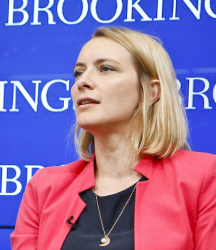On January 6, 2021, while members of Congress met to certify the election of Joe Biden as the next president of the United States, a pro-Trump mob — urged on by the president — stormed and occupied the Capitol in Washington, D.C. The insurrection was met with shock around the country and the world.
Below, Brookings experts on foreign policy explain how the dramatic events are being viewed globally.
 Madiha Afzal (@MadihaAfzal), David M. Rubenstein Fellow in the Center for Middle East Policy and the Center for Security, Strategy, and Technology: The official reaction in Pakistan was limited to the foreign ministry, which issued a relatively bland statement saying it was watching the events in Washington, and that it hoped for the situation to normalize soon and not to impact the presidential transition.
Madiha Afzal (@MadihaAfzal), David M. Rubenstein Fellow in the Center for Middle East Policy and the Center for Security, Strategy, and Technology: The official reaction in Pakistan was limited to the foreign ministry, which issued a relatively bland statement saying it was watching the events in Washington, and that it hoped for the situation to normalize soon and not to impact the presidential transition.
The public reaction was louder — and many-layered. People were watching closely, certainly. There was shock at the images of the insurrection in Washington unfolding on their screens. Some noted that past statements that American officials made on political transitions in Pakistan would be more applicable to the United States at this point. But at the same time, there was strong resistance to simple comparisons between the United States and countries like Pakistan. There was a sense that America had to reckon with its problems rather than indulge in a facile takedown of other countries at its own moment of crisis. And Pakistani meme-makers went to work — juxtaposing pictures of the pro-Trump extremists who stormed the Capitol next to right-wing extremists in Pakistan who have caused major destruction in the streets of Islamabad during sit-ins, very close to the seat of government.
All in all, it seems clear that these images will linger in the minds of those abroad. And that means that there will be a need for greater humility and sensitivity as America deals with issues of democracy around the world, including in countries like Pakistan.
 Ranj Alaaldin (@ranjalaaldin), Nonresident Fellow in the Center for Middle East Policy: The insurrection has empowered nefarious actors in Iraq, the militia groups and criminal enterprises who thrive when America’s democracy becomes imperiled. That has deadly implications for the local population. Away from the glare of the international media, it is the progressives and moderates in unstable and conflict-stricken countries like Iraq that suffer, both in the short and long term. Iraq’s protest movement has made a brave push for democratic values and good governance, at great cost to the wider civilian population and in the face of powerful Iran-aligned death squads and paramilitary groups. The rioting in Washington on January 6 will empower these groups as they look to exploit the insurrection to mount additional violent crackdowns against protesters and civil society. Some in Iraq also wish to use the January 6 events to distort and undermine the fundamental international norms and democratic principles that large swathes of the Iraqi population have embraced, but that ruling elites have struggled to implement. America’s failure to practice what it preaches has limited consequences at home, where democratic and law enforcement institutions are still strong and effective, but the consequences for others elsewhere around the world can be deadly and devastating.
Ranj Alaaldin (@ranjalaaldin), Nonresident Fellow in the Center for Middle East Policy: The insurrection has empowered nefarious actors in Iraq, the militia groups and criminal enterprises who thrive when America’s democracy becomes imperiled. That has deadly implications for the local population. Away from the glare of the international media, it is the progressives and moderates in unstable and conflict-stricken countries like Iraq that suffer, both in the short and long term. Iraq’s protest movement has made a brave push for democratic values and good governance, at great cost to the wider civilian population and in the face of powerful Iran-aligned death squads and paramilitary groups. The rioting in Washington on January 6 will empower these groups as they look to exploit the insurrection to mount additional violent crackdowns against protesters and civil society. Some in Iraq also wish to use the January 6 events to distort and undermine the fundamental international norms and democratic principles that large swathes of the Iraqi population have embraced, but that ruling elites have struggled to implement. America’s failure to practice what it preaches has limited consequences at home, where democratic and law enforcement institutions are still strong and effective, but the consequences for others elsewhere around the world can be deadly and devastating.
 Marsin Alshamary (@MarsinRA), Post-Doctoral Fellow in the Foreign Policy program: In Iraq, the public is seeing parallels between the Washington, D.C. insurrection and their own experience with politics in the last 17 years. Iraqi social media is flooded with comedic takes on the events in Washington, which make direct comparisons between Iraqi and American political figures. For example, Iraqis are recalling an event in 2016 when the followers of Muqtada al-Sadr overtook the Iraqi parliament, although that event was unrelated to election results. In a tweet, Sadr wrote: “We have always told you that Western democracy is misleading and artificial.”
Marsin Alshamary (@MarsinRA), Post-Doctoral Fellow in the Foreign Policy program: In Iraq, the public is seeing parallels between the Washington, D.C. insurrection and their own experience with politics in the last 17 years. Iraqi social media is flooded with comedic takes on the events in Washington, which make direct comparisons between Iraqi and American political figures. For example, Iraqis are recalling an event in 2016 when the followers of Muqtada al-Sadr overtook the Iraqi parliament, although that event was unrelated to election results. In a tweet, Sadr wrote: “We have always told you that Western democracy is misleading and artificial.”
Other Iraqi political elites, particularly those not allied with the U.S., have reacted in a similar way to leaders of authoritarian countries who were eager to expose the pitfalls of American democracy and double standards. More balanced analysis of the events in Washington point to the fact that democratization is always a work in progress and should never be taken for granted. In the future, the U.S. would be well-advised to approach democratizing states with less hubris and to recognize that the social divisions that make governance difficult in Iraq are similar to the unaddressed social and racial inequalities that plague American society.
 Célia Belin (@celiabelin), Visiting Fellow in the Center on the United States and Europe: The events this week have been intensely covered by French media and followed by a French public mostly staying at home under COVID-19 restrictions. On social media, they expressed incredulity and shock, but also dismay at the underperformance of law enforcement, and the perceived amateurism of the rioters. Compared to other European countries, official reactions came in relatively late in the day and did not directly lay the blame on President Trump. French President Emmanuel Macron issued an unusual video in front of U.S., French, and European Union flags, where he expressed solidarity and faith in the resiliency of American democracy. He stressed the common threats facing democracies such as France and the United States, echoing a favored theme.
Célia Belin (@celiabelin), Visiting Fellow in the Center on the United States and Europe: The events this week have been intensely covered by French media and followed by a French public mostly staying at home under COVID-19 restrictions. On social media, they expressed incredulity and shock, but also dismay at the underperformance of law enforcement, and the perceived amateurism of the rioters. Compared to other European countries, official reactions came in relatively late in the day and did not directly lay the blame on President Trump. French President Emmanuel Macron issued an unusual video in front of U.S., French, and European Union flags, where he expressed solidarity and faith in the resiliency of American democracy. He stressed the common threats facing democracies such as France and the United States, echoing a favored theme.
Marine Le Pen, leader of the far-right National Rally, deplored the events and recognized Biden as the president-elect. But her camp continues to express support for Donald Trump and spread conspiracy theories regarding fraud allegations and antifa rioters. She also denounced censorship of Trump on social media, which the vice president of the National Rally called “digital totalitarianism.” Jean-Luc Mélenchon, of the far-left France Insoumise, suggested that this was a natural backlash in response to the U.S. “organizing coups” and “rigging elections” abroad. Some French have compared the violence of the riot in the Capitol to the Gilets Jaunes (yellow vest) protests, in particular the 2018 vandalizing of the Arc de Triomphe. In the context of a tense pre-presidential campaign season, many French view the political divisions and violence plaguing America as harbingers of conflicts to come in their own country.
 Charles T. Call (@call4pax), Nonresident Senior Fellow in the Center for Security, Strategy, and Technology and the Latin America Initiative: The sight of the U.S. Capitol being invaded by a mob sparked diverse reactions among Latin Americans, including horror, sympathy, and familiarity. One common reaction was to dismiss the notion of American exceptionalism. The United States showed itself to have much in common with other countries that have experienced instability, racism, and authoritarianism. Correspondingly, many used the occasion to criticize the moralizing tone of U.S. policy toward the region, noting that preaching about democracy and human rights will ring hollow. Some denounced the centuries-old “Monroe Doctrine,” which had been re-embraced by the Trump administration. Humorous memes about banana republics and the U.S. role in perpetrating coups swept through social media.
Charles T. Call (@call4pax), Nonresident Senior Fellow in the Center for Security, Strategy, and Technology and the Latin America Initiative: The sight of the U.S. Capitol being invaded by a mob sparked diverse reactions among Latin Americans, including horror, sympathy, and familiarity. One common reaction was to dismiss the notion of American exceptionalism. The United States showed itself to have much in common with other countries that have experienced instability, racism, and authoritarianism. Correspondingly, many used the occasion to criticize the moralizing tone of U.S. policy toward the region, noting that preaching about democracy and human rights will ring hollow. Some denounced the centuries-old “Monroe Doctrine,” which had been re-embraced by the Trump administration. Humorous memes about banana republics and the U.S. role in perpetrating coups swept through social media.
On the other hand, Latin American commentators also expressed sadness and sympathy with the plight of the United States. Already concerned about the rise of authoritarian populism in the region, pro-democracy advocates in the region see the urgency of the fight against white nationalism and extremism in the United States. There is little question that the fate of political movements in the United States affects the region, and the disquiet felt by North Americans is also being felt by Latin Americans.
 Vanda Felbab-Brown (@VFelbabBrown), Senior Fellow in the Center for Security, Strategy, and Technology: Mexican President Andrés Manuel López Obrador remains one of the world’s few leaders who has not condemned the violence on Capitol Hill. Under the guise of non-interference in other countries’ affairs, he stated: “We’re not going to intervene in these matters, which are up to the Americans to resolve.” Yet at the same time, this very week, he offered asylum to Julian Assange, clearly prepared to interfere in U.S. justice issues.
Vanda Felbab-Brown (@VFelbabBrown), Senior Fellow in the Center for Security, Strategy, and Technology: Mexican President Andrés Manuel López Obrador remains one of the world’s few leaders who has not condemned the violence on Capitol Hill. Under the guise of non-interference in other countries’ affairs, he stated: “We’re not going to intervene in these matters, which are up to the Americans to resolve.” Yet at the same time, this very week, he offered asylum to Julian Assange, clearly prepared to interfere in U.S. justice issues.
Despite the invectives President Trump has levied against Mexican people, López Obrador has maintained a sort of friendship with Donald Trump, a relationship based on the Trump administration’s willingness to ignore Mexico’s faulty policies and backsliding in a range of issues. López Obrador issued an oblique statement in response to questions about the mob aggression on Capitol Hill, saying: “We hope there will be peace, that democracy, which is the people’s power, will prevail.” That can be read between the lines as an endorsement of Trump’s tactics of street protests and thuggery, something López Obrador, a fellow populist, employed in order to protest and try to reverse his electoral defeat in 2006. The Mexican president also criticized Facebook and Twitter for banning Trump for his incitement of the violence.
López Obrador’s lack of condemnation is all the more significant given the Mexican government’s recent actions: López Obrador refused to congratulate Joe Biden on his electoral victory and recently announced that he would not attend Biden’s inauguration. And last month, he eviscerated U.S.-Mexican security cooperation. López Obrador is setting up a posture of a very cold shoulder, bordering on hostility, toward the incoming Biden administration.
 Lindsey W. Ford (@lindseywford), David M. Rubenstein Fellow in the Center for East Asia Policy Studies: The images of an armed mob attacking the U.S. Capitol sent shock waves through allied capitals. In Canberra, Australian officials expressed dismay over the violent attack, but were quick to affirm their faith in the resilience of America’s democratic institutions and the strength of the American people. This support from U.S. allies is not merely an offering of friendship. It reflects the recognition that the resilience of the American system and America’s exercise of democracy at home has implications for the exercise of democracy abroad. As one Australian scholar argued this past week: “American democracy matters too much for us to remain silent.”
Lindsey W. Ford (@lindseywford), David M. Rubenstein Fellow in the Center for East Asia Policy Studies: The images of an armed mob attacking the U.S. Capitol sent shock waves through allied capitals. In Canberra, Australian officials expressed dismay over the violent attack, but were quick to affirm their faith in the resilience of America’s democratic institutions and the strength of the American people. This support from U.S. allies is not merely an offering of friendship. It reflects the recognition that the resilience of the American system and America’s exercise of democracy at home has implications for the exercise of democracy abroad. As one Australian scholar argued this past week: “American democracy matters too much for us to remain silent.”
Yet this past week’s events also reminded U.S. allies that the power of America’s example can cut both ways. Over the past few months, President Trump’s disinformation campaign spread to Australia’s shores as well. Conservative media outlets echoed President Trump’s talking points. Members of parliament shared social media posts spreading U.S. conspiracy theories. Australian Prime Minister Scott Morrison is now under fire to denounce these statements from members of his party.
Australia and the United States have fought side-by-side to defend democracy for decades. In the past few years, both countries have both been on the forefront of global efforts to fight disinformation and authoritarianism abroad. But this past week should serve as a powerful reminder that these efforts cannot be divorced from the need to protect democratic institutions at home.
 Ryan Hass (@ryanl_hass), Senior Fellow in the John L. Thornton China Center and the Center for East Asia Policy Studies: The January 6 insurrection in Washington, D.C., provided powerful ammunition to Chinese propagandists that long have sought to delegitimize democracy as a dangerous Western conceit that lacks solutions for 21st-century societal challenges. Chinese media outlets broadcast images of mayhem inside the American Capitol to a domestic audience to buttress a narrative of America as a country in descent, plagued by deep divisions and a broken political system. Externally, official Chinese media outlets used news of the insurrection to make the case that the greatest threat the United States faces is itself, not China. When the day began January 6, one of the major news stories was the arrest of over 50 pro-democracy leaders in Hong Kong. The insurrection in Washington, D.C., deflected international attention away from this deeply troubling development. The images of insurrectionists occupying America’s legislative seat of power will be part of the Chinese official media’s playback loop for a long time to come. The incoming Biden administration will need to take early and durable steps to chip away at a solidifying perception in Beijing that the United States has lost its capacity for self-correction.
Ryan Hass (@ryanl_hass), Senior Fellow in the John L. Thornton China Center and the Center for East Asia Policy Studies: The January 6 insurrection in Washington, D.C., provided powerful ammunition to Chinese propagandists that long have sought to delegitimize democracy as a dangerous Western conceit that lacks solutions for 21st-century societal challenges. Chinese media outlets broadcast images of mayhem inside the American Capitol to a domestic audience to buttress a narrative of America as a country in descent, plagued by deep divisions and a broken political system. Externally, official Chinese media outlets used news of the insurrection to make the case that the greatest threat the United States faces is itself, not China. When the day began January 6, one of the major news stories was the arrest of over 50 pro-democracy leaders in Hong Kong. The insurrection in Washington, D.C., deflected international attention away from this deeply troubling development. The images of insurrectionists occupying America’s legislative seat of power will be part of the Chinese official media’s playback loop for a long time to come. The incoming Biden administration will need to take early and durable steps to chip away at a solidifying perception in Beijing that the United States has lost its capacity for self-correction.
The images of insurrectionists occupying America’s legislative seat of power will be part of the Chinese official media’s playback loop for a long time to come.
 Kemal Kirişci (@kemalkirisci), Nonresident Senior Fellow in the Center on the United States and Europe: The images from the storming of the Capitol by a pro-Trump mob attracted reactions from all around the world. The Turkish response raised some eyebrows. The Ministry of Foreign Affairs called “on all parties in the U.S. to maintain restraint and prudence,” as if the winners of an extensively scrutinized election were on par with sore losers, ready to disregard all institutions and norms of a democratic country. It then went on to advise “Turkish citizens in the U.S. to avoid crowded areas and places where protests are taking place,” mirroring standard U.S. State Department travel advisories for U.S. citizens visiting countries facing disturbances (including a recent one for Turkey).
Kemal Kirişci (@kemalkirisci), Nonresident Senior Fellow in the Center on the United States and Europe: The images from the storming of the Capitol by a pro-Trump mob attracted reactions from all around the world. The Turkish response raised some eyebrows. The Ministry of Foreign Affairs called “on all parties in the U.S. to maintain restraint and prudence,” as if the winners of an extensively scrutinized election were on par with sore losers, ready to disregard all institutions and norms of a democratic country. It then went on to advise “Turkish citizens in the U.S. to avoid crowded areas and places where protests are taking place,” mirroring standard U.S. State Department travel advisories for U.S. citizens visiting countries facing disturbances (including a recent one for Turkey).
A second response came from the speaker of the Turkish parliament in the form of a tweet expressing the belief that problems can “always be solved within law and democracy,” adding: “As Turkey, we have always been in favor of the law and democracy and we recommend it to everyone.” Since those statements, “law and democracy” in the U.S. has prevailed, setting the scene for a peaceful transfer of power. The disingenuity of the calls coming from a country listed as “not free” by the Freedom House’s annual study of political rights and civil liberties worldwide is self-evident.
More striking is the wording of these statements. They are an almost verbatim translation of the statements issued by the U.S. government as the Turkish parliament was attacked by F-16s during a military coup attempt in July 2016 — suggesting sarcasm rather than genuine concern.
 Suzanne Maloney (@maloneysuzanne), Vice President and Director of the Foreign Policy program: For Iran’s leaders, the dramatic developments in Washington offered tantalizing vindication of their long-held narrative about the failure of liberal democracy and the inevitable decline of the West. Supreme Leader Ayatollah Ali Khamenei used the episode to deride American politics as a “fiasco,” adding that “today, the U.S. and ‘American values’ are ridiculed even by their friends.” Hossein Dehqan, a former defense minister and aspiring presidential candidate, sneered on Twitter that the “architect of all riots, coup d’etats, and color revolutions” now had its own Congress “overtaken by protesters.”
Suzanne Maloney (@maloneysuzanne), Vice President and Director of the Foreign Policy program: For Iran’s leaders, the dramatic developments in Washington offered tantalizing vindication of their long-held narrative about the failure of liberal democracy and the inevitable decline of the West. Supreme Leader Ayatollah Ali Khamenei used the episode to deride American politics as a “fiasco,” adding that “today, the U.S. and ‘American values’ are ridiculed even by their friends.” Hossein Dehqan, a former defense minister and aspiring presidential candidate, sneered on Twitter that the “architect of all riots, coup d’etats, and color revolutions” now had its own Congress “overtaken by protesters.”
Elsewhere, pro-government social media highlighted the apparent hypocrisy of American public diplomacy during times of turbulence within Iran. Some made derisive comparisons between the death of a woman who joined in the attack on the Capitol and Neda Aghasoltan, whose murder became a symbol of Tehran’s vicious repression of its 2009 protests. However, the effectiveness of the government’s propaganda is unclear; in a televised discussion, several activists challenged the seeming approval of the upheaval at the Capitol against the condemnations of Iranian protesters.
Wednesday’s scenes of frenzied crowds scaling the walls of the U.S. Capitol and overrunning security to wreak havoc in the halls of American power evoked memories of the 1979 seizure of the U.S. Embassy in Tehran. Iran’s descent in mob violence did not end well. The embassy takeover facilitated the full descent of the revolution’s democratic aspirations into an authoritarian theocracy and generated a bitter standoff with Washington that continues today. At a time when tensions between the two countries are at a discomfiting high, the unrest and political polarization in the United States only intensifies the dangers.
Wednesday’s scenes … evoked memories of the 1979 seizure of the U.S. Embassy in Tehran.
 Michael O’Hanlon (@MichaelEOHanlon), Senior Fellow and Co-Director for the Center for Security, Strategy, and Technology: I am not tracking any one country or region in particular; my esteemed colleagues do that much better than I can, and I take seriously what they say about the concerns around the world. However, I am more relaxed than some on this issue. While January 6 was a terrible day for our nation, it was also a sobering day that has already produced a partial correction. Moreover, the nation has made huge mistakes before — think Vietnam, for example, or the early conduct of the Iraq war — and recovered internationally. Other countries do not make their decisions about alliances and other such grave matters of war and peace, or economic alignment, based on popularity contests or any expectation that the United States is unblemished. Had Trump won reelection, that would have been serious. But this domestic tragedy, however scary, will soon be placed in a larger context. Based on its geography, its demographics, its Constitution, and its power, the United States will still enjoy much the same position in future world affairs as it has had in the recent past, I predict.
Michael O’Hanlon (@MichaelEOHanlon), Senior Fellow and Co-Director for the Center for Security, Strategy, and Technology: I am not tracking any one country or region in particular; my esteemed colleagues do that much better than I can, and I take seriously what they say about the concerns around the world. However, I am more relaxed than some on this issue. While January 6 was a terrible day for our nation, it was also a sobering day that has already produced a partial correction. Moreover, the nation has made huge mistakes before — think Vietnam, for example, or the early conduct of the Iraq war — and recovered internationally. Other countries do not make their decisions about alliances and other such grave matters of war and peace, or economic alignment, based on popularity contests or any expectation that the United States is unblemished. Had Trump won reelection, that would have been serious. But this domestic tragedy, however scary, will soon be placed in a larger context. Based on its geography, its demographics, its Constitution, and its power, the United States will still enjoy much the same position in future world affairs as it has had in the recent past, I predict.
 Bruce Riedel, Senior Fellow in the Center for Middle East Policy: Saudi Arabia and the Gulf states closely watched the riot at the U.S. Capitol on January 6. The Saudi media covered the story extensively; Qatar’s Al Jazeera was even more fixated on the dramatic attack and the condemnation of President Trump that has ensued. The Saudis have been very supportive of Trump since 2016, especially after they were implicated in the murder of journalist Jamal Khashoggi. Riyadh is very concerned that the new administration is going to reassess ties with the kingdom for the worse. With President Trump leaving under the shadow of inciting violence against Congress, their alarm is all the more unsettling for the royals closest to Trump and his family. Crown Prince Muhammad bin Salman is especially vulnerable, given his role in reportedly orchestrating Khashoggi’s death and in the Yemen war. He can expect nothing like the complete support he got from the Trump, and he will face skeptical scrutiny from the Biden team and the new Congress. The Saudis are right to be worried by their four years of close association with a man now tainted as both a loser and a violent threat to the rule of law.
Bruce Riedel, Senior Fellow in the Center for Middle East Policy: Saudi Arabia and the Gulf states closely watched the riot at the U.S. Capitol on January 6. The Saudi media covered the story extensively; Qatar’s Al Jazeera was even more fixated on the dramatic attack and the condemnation of President Trump that has ensued. The Saudis have been very supportive of Trump since 2016, especially after they were implicated in the murder of journalist Jamal Khashoggi. Riyadh is very concerned that the new administration is going to reassess ties with the kingdom for the worse. With President Trump leaving under the shadow of inciting violence against Congress, their alarm is all the more unsettling for the royals closest to Trump and his family. Crown Prince Muhammad bin Salman is especially vulnerable, given his role in reportedly orchestrating Khashoggi’s death and in the Yemen war. He can expect nothing like the complete support he got from the Trump, and he will face skeptical scrutiny from the Biden team and the new Congress. The Saudis are right to be worried by their four years of close association with a man now tainted as both a loser and a violent threat to the rule of law.
 Natan Sachs (@natansachs), Fellow and Director of the Center for Middle East Policy: The scenes in Washington on January 6 were deeply troubling for America and, by extension, for its standing in the world and for the very image of democracy worldwide. The most important aspect is clear: an attempt, incited by a sitting president, to disrupt the core constitutional process of transfer of power. There is a major silver lining here: Congress reconvened, and there is value in the symbolism of Vice President Mike Pence himself officially confirming the victory of Joe Biden and Kamala Harris. And yet the images were striking and reached across the globe. America was unable to conduct what should be regular and boring business without mayhem sent from 1600 Pennsylvania Avenue. Moreover, as more than one foreign observer said to me: If the United States cannot even protect the office of the speaker of the house, or the dais in the House of Representatives chambers, from rioters clad in Viking helmets, what has happened to America’s basic capacity to govern its affairs? This comes, of course, after four years of domestic turmoil and amid a remarkable and continuing failure of the U.S. government to deal with the COVID-19 pandemic. Here too, the silver lining is important. Despite all the gloating on official media in Russia, China, and Iran, the United States institutions did prevail. The “city upon the hill” shines less brightly today, but it’s still standing, if in need of a major cleanup.
Natan Sachs (@natansachs), Fellow and Director of the Center for Middle East Policy: The scenes in Washington on January 6 were deeply troubling for America and, by extension, for its standing in the world and for the very image of democracy worldwide. The most important aspect is clear: an attempt, incited by a sitting president, to disrupt the core constitutional process of transfer of power. There is a major silver lining here: Congress reconvened, and there is value in the symbolism of Vice President Mike Pence himself officially confirming the victory of Joe Biden and Kamala Harris. And yet the images were striking and reached across the globe. America was unable to conduct what should be regular and boring business without mayhem sent from 1600 Pennsylvania Avenue. Moreover, as more than one foreign observer said to me: If the United States cannot even protect the office of the speaker of the house, or the dais in the House of Representatives chambers, from rioters clad in Viking helmets, what has happened to America’s basic capacity to govern its affairs? This comes, of course, after four years of domestic turmoil and amid a remarkable and continuing failure of the U.S. government to deal with the COVID-19 pandemic. Here too, the silver lining is important. Despite all the gloating on official media in Russia, China, and Iran, the United States institutions did prevail. The “city upon the hill” shines less brightly today, but it’s still standing, if in need of a major cleanup.
 Constanze Stelzenmüller (@ConStelz), Senior Fellow in the Center on the United States and Europe: In Germany, Chancellor Angela Merkel made unusually frank comments on the day after the storming of the Capitol: She spoke of “disturbing images” that had made her “furious and also sad.” Laying the blame squarely at the feet of the president, she said “I greatly regret that president Trump did not concede his defeat in November — or yesterday,” and she added that this had “created the atmosphere in which such violent events become possible.” The country’s president, Frank-Walter Steinmeier, was even more forthright; he called the protesters “an armed mob, incited by a sitting president.” However, he also reminded Germans that QAnon believers had attempted to storm the Reichstag building in Berlin in August. Daniel Brössler, a commentator for the German daily Süddeutsche Zeitung, reminded readers that democracy in Germany has also been under attack from right-wing forces in Germany. He wrote: “Germany‘s democracy owes its existence to the U.S. Now it owes them solidarity, no less than after the attacks of 9/11. Including for its own sake. The notion that German democracy could survive without its American counterpart is absurd.”
Constanze Stelzenmüller (@ConStelz), Senior Fellow in the Center on the United States and Europe: In Germany, Chancellor Angela Merkel made unusually frank comments on the day after the storming of the Capitol: She spoke of “disturbing images” that had made her “furious and also sad.” Laying the blame squarely at the feet of the president, she said “I greatly regret that president Trump did not concede his defeat in November — or yesterday,” and she added that this had “created the atmosphere in which such violent events become possible.” The country’s president, Frank-Walter Steinmeier, was even more forthright; he called the protesters “an armed mob, incited by a sitting president.” However, he also reminded Germans that QAnon believers had attempted to storm the Reichstag building in Berlin in August. Daniel Brössler, a commentator for the German daily Süddeutsche Zeitung, reminded readers that democracy in Germany has also been under attack from right-wing forces in Germany. He wrote: “Germany‘s democracy owes its existence to the U.S. Now it owes them solidarity, no less than after the attacks of 9/11. Including for its own sake. The notion that German democracy could survive without its American counterpart is absurd.”
The Brookings Institution is committed to quality, independence, and impact.
We are supported by a diverse array of funders. In line with our values and policies, each Brookings publication represents the sole views of its author(s).





















Commentary
Around the halls: How leaders and publics around the world are reacting to events at the Capitol
January 8, 2021